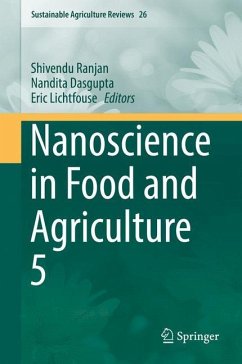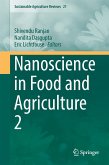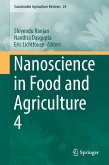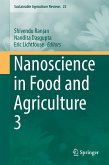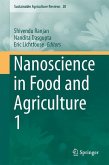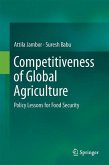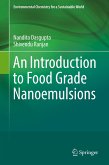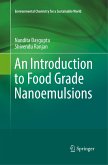Nanoscience in Food and Agriculture 5
Herausgegeben:Ranjan, Shivendu; Dasgupta, Nandita; Lichtfouse, Eric
Nanoscience in Food and Agriculture 5
Herausgegeben:Ranjan, Shivendu; Dasgupta, Nandita; Lichtfouse, Eric
- Gebundenes Buch
- Merkliste
- Auf die Merkliste
- Bewerten Bewerten
- Teilen
- Produkt teilen
- Produkterinnerung
- Produkterinnerung
This book presents comprehensive reviews on the principles, design and applications of nanomaterials in the food and agriculture sectors. This book is the fifth of several volumes on Nanoscience in Food and Agriculture, published in the series Sustainable Agriculture Reviews.
Andere Kunden interessierten sich auch für
![Nanoscience in Food and Agriculture 2 Nanoscience in Food and Agriculture 2]() Nanoscience in Food and Agriculture 2116,99 €
Nanoscience in Food and Agriculture 2116,99 €![Nanoscience in Food and Agriculture 4 Nanoscience in Food and Agriculture 4]() Nanoscience in Food and Agriculture 477,99 €
Nanoscience in Food and Agriculture 477,99 €![Nanoscience in Food and Agriculture 3 Nanoscience in Food and Agriculture 3]() Nanoscience in Food and Agriculture 3116,99 €
Nanoscience in Food and Agriculture 3116,99 €![Nanoscience in Food and Agriculture 1 Nanoscience in Food and Agriculture 1]() Nanoscience in Food and Agriculture 1116,99 €
Nanoscience in Food and Agriculture 1116,99 €![Competitiveness of Global Agriculture Competitiveness of Global Agriculture]() Attila JamborCompetitiveness of Global Agriculture77,99 €
Attila JamborCompetitiveness of Global Agriculture77,99 €![An Introduction to Food Grade Nanoemulsions An Introduction to Food Grade Nanoemulsions]() Nandita DasguptaAn Introduction to Food Grade Nanoemulsions77,99 €
Nandita DasguptaAn Introduction to Food Grade Nanoemulsions77,99 €![An Introduction to Food Grade Nanoemulsions An Introduction to Food Grade Nanoemulsions]() Nandita DasguptaAn Introduction to Food Grade Nanoemulsions77,99 €
Nandita DasguptaAn Introduction to Food Grade Nanoemulsions77,99 €-
-
-
This book presents comprehensive reviews on the principles, design and applications of nanomaterials in the food and agriculture sectors. This book is the fifth of several volumes on Nanoscience in Food and Agriculture, published in the series Sustainable Agriculture Reviews.
Produktdetails
- Produktdetails
- Sustainable Agriculture Reviews 26
- Verlag: Springer / Springer International Publishing / Springer, Berlin
- Artikelnr. des Verlages: 978-3-319-58495-9
- 1st ed. 2017
- Seitenzahl: 380
- Erscheinungstermin: 21. Juli 2017
- Englisch
- Abmessung: 241mm x 160mm x 26mm
- Gewicht: 678g
- ISBN-13: 9783319584959
- ISBN-10: 3319584952
- Artikelnr.: 48037870
- Herstellerkennzeichnung Die Herstellerinformationen sind derzeit nicht verfügbar.
- Sustainable Agriculture Reviews 26
- Verlag: Springer / Springer International Publishing / Springer, Berlin
- Artikelnr. des Verlages: 978-3-319-58495-9
- 1st ed. 2017
- Seitenzahl: 380
- Erscheinungstermin: 21. Juli 2017
- Englisch
- Abmessung: 241mm x 160mm x 26mm
- Gewicht: 678g
- ISBN-13: 9783319584959
- ISBN-10: 3319584952
- Artikelnr.: 48037870
- Herstellerkennzeichnung Die Herstellerinformationen sind derzeit nicht verfügbar.
Shivendu Ranjan Shivendu Ranjan is currently working as DBT-Research Fellow, Department of Biotechnology, Ministry of Science and Technology, Govt of India at VIT University, Vellore, Tamil Nadu, India. He is also serving for a non government organization as an Honorary-Director, Research Wing, Veer Kunwar Singh Memorial Trust, Chapra, Bihar, India. He is the Founder-Director at Xpert Arena Technological Services Pvt. Ltd., India (www.xpertarena.com); this company is dedicated to serve in online and offline sectors with a vision to simplify the education. He has also founded and drafted the concept for first edition of "VIT Bio Summit" in 2012 and the same has been continued till date by the university. His area of research is multidisciplinary which are as but not limited to: Nano-food technology, Nano-agri technology, Nanobiotechnology, Nano-toxicology, Natural products technology, Natural products chemistry, Bio-business, Food chemistry and Food Engineering. He has published many scientific articles in international peer reviewed journals and also serving as editorial board member and referee for reputed international peer reviewed journals. He has bagged several awards from different organizations e.g. Best poster award, achiever award, research award, young researcher award etc. Nandita Dasgupta Nandita Dasgupta is currently serving as Research Associate at VIT University, Vellore, Tamil Nadu, India. She has exposure of research institutes and industries including CSIR-Central Food Technological Research Institute, Mysore, India and Uttar Pradesh Drugs and Pharmaceutical Co. Ltd., Lucknow, India. Her areas of interest include toxicological analysis, natural products technology, nanobiotechnology and agri-food technology. She has published many scientific articles in international peer reviewed journals and also serving as editorial board member and referee for reputed international peer reviewed journals. She has received Elsevier Certificate for "Outstanding Contribution" in Reviewing from Elsevier, The Netherlands. She has also been nominated for Elsevier advisory panel for Elsevier, The Netherlands. She was the Guest Editor in Journal of Chemistry for the special issue entitled "Food Nanotechnology Opportunities and Challenges". She has received several awards from different organizations e.g. Best poster award, young researcher award, Special achiever award, research award, etc. Eric Lichtfouse Eric Lichtfouse, is a soil scientist at the French National Institute for Agricultural Research (INRA). He has invented the 13C-dating method allowing to measure the dynamics of soil organic molecules, thus opening the field of molecular-level investigations of soil carbon sequestration. Chief Editor of the awardedjournal Agronomy for Sustainable Development, he has raised the journal rank from 29/53 in 2003, with an impact factor of 0.56, to 2/81 in 2014, with an impact factor of 3.99, in the Agronomy category. He is also Chief Editor and founder of the journal Environmental Chemistry Letters and the book series Sustainable Agriculture Reviews. He is lecturing scientific writing and communication in universities worldwide. His publication assistance service at the INRA has founded the french-english newsletter Publier La Science. He has published the book Scientific Writing for Impact Factor Journal. This textbook describes in particular the micro-article, a new tool to identify the novelty of experimental results. Further details are available on Slideshare, LinkedIn, ResearchGate, ResearcherID and Orcid.
Chapter 01: Research trends and patents in nano-food and agriculture.- Chapter 02: Politics of nanotechnologies in food and agriculture.- Chapter 03: Nanosensors for Food and Agriculture.- Chapter 04: Nanoemulsions for nutrient delivery in food.- Chapter 05: Nanocarriers for resveratrol delivery.- Chapter 06: Milk proteins as nanoencapsulation materials in the food industry.- Chapter 07: Interactions of nanomaterials with plants.- Chapter 08: Nanomaterial impact, toxicity and regulation in agriculture, food and environement.- Chapter 09: Nanomaterial toxicity in microbes, plants and animals.- Chapter 10: Nanofertilizers for sustainable soil management.- Chapter 11; Impact of nanomaterials on the aquatic food chain.-Chapter 12: Nanoremediation for sustainable crop production.
Chapter 01: Research trends and patents in nano-food and agriculture.- Chapter 02: Politics of nanotechnologies in food and agriculture.- Chapter 03: Nanosensors for Food and Agriculture.- Chapter 04: Nanoemulsions for nutrient delivery in food.- Chapter 05: Nanocarriers for resveratrol delivery.- Chapter 06: Milk proteins as nanoencapsulation materials in the food industry.- Chapter 07: Interactions of nanomaterials with plants.- Chapter 08: Nanomaterial impact, toxicity and regulation in agriculture, food and environement.- Chapter 09: Nanomaterial toxicity in microbes, plants and animals.- Chapter 10: Nanofertilizers for sustainable soil management.- Chapter 11; Impact of nanomaterials on the aquatic food chain.-Chapter 12: Nanoremediation for sustainable crop production.

